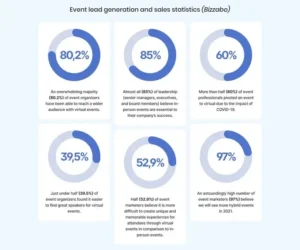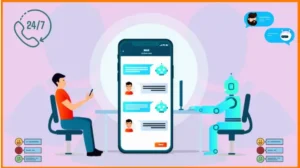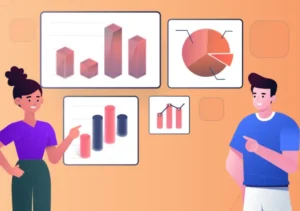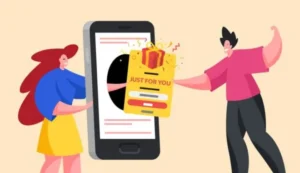Event Schedule | Event Location

B2B events have emerged as crucial opportunities to connect with potential customers, showcase products or services, and generate valuable leads. This is a great way of connecting with your potential clients in a more approachable manner, all thanks to face-to-face interactions.
B2B Leads Explained
Basically, B2B leads refer to potential businesses that have shown interest in your product or service and have the potential to become paying customers.

In the B2B (business-to-business) context, these leads are typically other businesses or professionals who are looking for solutions to their specific needs or challenges.
For example, if you offer software for project management, a B2B lead could be a company that is interested in streamlining its project processes and is actively seeking a software solution to help them achieve that.
What is B2B Event Marketing?
B2B event marketing refers to the strategic planning, execution, and promotion of events specifically designed to connect businesses, professionals, and industry stakeholders.
It involves using events, online, offline, or hybrid, as a marketing channel to achieve various objectives such as lead generation, brand awareness, thought leadership, relationship building, and sales acceleration in the B2B (business-to-business) context.
B2B event marketing encompasses a wide range of event types, including trade shows, conferences, seminars, workshops, webinars, product launches, industry summits, and networking events.
These events are typically targeted toward a specific industry, niche, or professional audience.
Let’s have a glance at some of the main advantages of such B2B events:
Lead Generation: Generating high-quality leads by attracting potential customers who are interested in the products or services offered by the participating businesses.
Brand Awareness: Increasing visibility and creating a positive impression of a company’s brand, products, or services among the target audience and industry influencers.
Thought Leadership: Establishing the participating company as a trusted authority and expert within its industry through presentations, panel discussions, or educational sessions.
Relationship Building: Facilitating networking opportunities for businesses to connect with industry professionals, potential clients, partners, and decision-makers.
Sales Enablement: Accelerating the sales process by providing a platform to engage with prospects, showcase products or services, and drive conversions.
Can B2B Events Generate High-Quality Leads?
Yes, absolutely! B2B events have the potential to generate high-quality leads and here are their reasons:
- Targeted Audience: B2B events attract a specific audience of industry professionals, decision-makers, and potential buyers who are actively seeking solutions and innovations within their respective fields. This focused gathering ensures that the leads generated are highly relevant and have a genuine interest in the products or services being showcased.
- Engagement & Interaction: These events provide opportunities for face-to-face, two-way engagement and interaction between businesses and potential customers. These personal interactions allow for in-depth discussions, question-and-answer sessions, and product demonstrations. Such direct engagement helps build trust, establish relationships, and qualify leads based on their level of interest and engagement.
- Demonstrations & Experiences: B2B organizations get a platform to showcase their products or services through live demonstrations, exhibits, or interactive experiences. These hands-on experiences allow attendees to see the value and functionality of the offerings firsthand, leading to a deeper understanding and increased interest. Qualified leads are more likely to emerge from those who engage with and express interest in these demonstrations.
- Networking Opportunities: There are several networking opportunities on offer, allowing businesses to connect with industry peers, influencers, potential partners, and decision-makers. Building relationships with these key individuals can lead to referrals, collaborations, and business opportunities. Networking at events helps identify and nurture high-quality leads with a higher potential for conversion.
- Thought Leadership and Credibility: By participating as speakers, panelists, or industry experts at B2B events, businesses can establish themselves as thought leaders in their respective fields. Sharing valuable insights, expertise, and industry trends builds credibility and positions the business as a trusted authority. This thought leadership status attracts the attention of attendees who are more likely to convert into high-quality leads.
- Lead Capture and Data Collection: B2B events provide opportunities to capture lead information through methods like badge scanning, business card exchange, or digital lead capture tools. These mechanisms allow businesses to collect contact details, preferences, and additional data from interested attendees. The data collected serves as a valuable resource for lead nurturing and further engagement beyond the event.
- Online Engagement: Live streaming of an event helps in connecting far-flung audiences that can easily access the entire event by means of the internet, attracting a diverse clientele from across borders.
The Path to B2B Event Lead Generation: 7 Proven Steps for Success
Here’s how you can maximize your B2B event success with these 8 proven steps to generate high-quality leads and drive business growth:
Step 1: Setting Clear Objectives for B2B Event Lead Generation
When it comes to lead generation, companies have varying objectives, with some prioritizing lead volume while others focus on precision targeting. Key components of lead generation goals encompass:
Lead Quantity: Determining the desired number of leads and assessing whether the sales team has the capacity to follow up effectively.
Conversion Rate: Establishing the expected conversion rate for the acquired leads.
Ticket Size: Evaluating the average ticket size, which directly impacts revenue potential.
To estimate the revenue potential of an event, it’s essential to consider the lead number, conversion rate, and average ticket size. By combining these factors, the expected revenue can be calculated using the following formula:
Revenue = Lead number x Conversion rate x Ticket size
Let’s illustrate this with a hypothetical example for Company XYZ:
Lead number: 150
Expected conversion rate: 8%
Average ticket size: $5,000
Revenue = 150 x 8% x $5,000 = $60,000
Once you’ve calculated the revenue, the next task is to develop a comprehensive budget for the event. Budgeting involves allocating resources, and estimating costs for various aspects such as booth/exhibit space, marketing materials, staff travel, and other necessary expenses.
Following the budgeting phase, it’s crucial to assess the event’s return on investment (ROI). The ROI calculation involves comparing the expected revenue generated from the event with the overall investment made, providing a clear understanding of the event’s financial impact.
For example, let’s consider Company XYZ’s budget for participating in an industry conference:
Budget allocated: $10,000
Expected revenue: $60,000
Expected net profit: $50,000 (Expected revenue – Event investment)
To calculate the ROI, we use the following formula:
ROI = (Net profit / Event investment) x 100%
In this case, the ROI for Company XYZ’s event participation would be:
ROI = ($50,000 / $10,000) x 100% = 500%
An ROI of 500% means that Company XYZ has earned $5 for every $1 invested in the event.
Calculating the ROI helps businesses rationalize their budgets, measure the success of their event investments, and determine the effectiveness of lead generation strategies employed.
A positive ROI indicates a higher return on investment, while a negative ROI signifies a loss on the investment, highlighting the importance of carefully assessing and optimizing event participation to maximize returns.
Step 2: Choosing the Type of the B2B Event
Selecting the right event type is a critical step in B2B event marketing, driven by factors such as product type, customer preferences, and the choice between online, offline, or hybrid formats.
Product Type Alignment: Consider the nature of your product or service and its suitability for different event formats. Certain products may benefit from hands-on demonstrations or physical interactions, making offline events more impactful. In contrast, virtual events can be highly effective for software demonstrations or knowledge-sharing sessions.
Customer Preferences: Understand the preferences and expectations of your target audience. Conduct market research or gather feedback to gauge their preferred event format.
Geographic Considerations: Assess the geographic distribution of your target audience. If your customer base is dispersed globally, hosting a virtual event can help overcome geographical barriers and attract attendees from around the world. Alternatively, if your target audience is concentrated in a specific region, an offline event may be more effective in reaching and engaging them.
Hybrid Event Potential: Consider the benefits of a hybrid event, which combines elements of both online and offline formats. Hybrid events allow for a broader reach by accommodating both in-person attendees and virtual participants.
Step 3: Selecting Compelling Topics &Influential Speakers
Choosing the right topics and speakers for your B2B event is crucial to capture audience interest and drive engagement.
Select topics that align with your target audience’s needs and interests, focusing on relevant industry trends, challenges, and innovative solutions. Identify influential speakers who possess subject matter expertise and can deliver impactful presentations that resonate with attendees.
Step 4: Promoting the Event
Promoting your B2B event effectively is essential to generate interest, attract attendees, and maximize lead generation. Develop a comprehensive promotional strategy that includes various channels such as:
Email Marketing: Utilize your email list to send out targeted event invitations, updates, and reminders. Segment your audience based on their interests and personalize the messages to increase engagement.
Social Media Platforms: Leverage popular social media platforms such as LinkedIn, Twitter, and Facebook to create event pages, share event announcements, and engage with your audience. Use event-specific hashtags and encourage attendees to share their excitement.
Content Marketing: Develop informative and engaging content related to your event, such as blog posts, articles, or videos. Share this content on your website, blog, and social media channels to build anticipation and establish thought leadership.
Industry-specific Forums and Communities: Participate in relevant online forums, discussion boards, and industry communities to share details about your event. Engage in conversations, answer questions, and provide value to the community, driving interest and attracting potential attendees.
Step 5: Boosting Event Participation Rates
Increasing the event participation rate is crucial for maximizing lead generation and creating a vibrant atmosphere at your B2B event. Here are some tips to boost attendance:
Incentives for Participation: Offer incentives such as exclusive access to resources, discounts on future products or services, or entry into prize draws for attendees who actively participate in sessions, ask questions, or engage in networking activities.
Surprises and Special Guests: Surprise attendees with unexpected elements like special guest speakers, industry influencers, or renowned experts. This can create excitement and add value to the event experience.
Small Gifts or Swag: Provide attendees with small gifts or event-branded swag items as a token of appreciation for their participation. These can include branded merchandise, useful tools, or educational materials.
Interactive Games and Leaderboards: Design interactive games or competitions that encourage attendee participation and create a sense of friendly competition. Display real-time leaderboards to foster engagement and reward active participants.
Step 6: Identifying High-Quality Leads
Identifying high-quality leads amidst the attendee pool is a crucial step in B2B event lead generation. Here are some strategies to help you effectively identify and prioritize valuable leads:
Pre-Event Research: Conduct thorough research on registered attendees to identify key decision-makers, influencers, and potential prospects. Utilize CRM tools, social media, and company websites to gather relevant information.
Lead Qualification Criteria: Define specific lead qualification criteria based on your ideal customer profile. This may include factors such as job title, company size, industry, or specific pain points that align with your product or service.
Engaging Conversations: During the event, engage in meaningful conversations with attendees to understand their needs, challenges, and potential fit with your offering. Ask open-ended questions and actively listen to gather insights and assess their level of interest.
Lead Scoring: Implement a lead scoring system to rank and prioritize leads based on their level of engagement, fit with your target criteria, and potential for conversion. Assign point values to different actions and behaviors exhibited by attendees.
Post-Event Follow-up: Promptly follow up with leads after the event to continue the conversation, provide additional information, and gauge their interest. Tailor your follow-up messages based on the insights gathered during the event interactions.
Step 7: Using Event Content for Promotion
After your B2B event concludes, leverage the event content to continue promoting and generating leads. Here’s how you can repurpose event content for ongoing lead generation:
- Make event recordings or session replays available to those who couldn’t attend or for attendees who want to revisit specific sessions.
- Summarize key takeaways, insights, and highlights from the event in blog posts or articles.
- Share speaker slide decks or presentations with attendees and non-attendees.
- Encourage attendees and participants to share their event experiences, insights, and takeaways on social media using event-specific hashtags.
The Bottom Line
Mastering B2B event lead generation requires a comprehensive approach that encompasses strategic goal-setting, thoughtful event selection, effective promotion, engaging attendee experiences, and strategic follow-up.
With careful planning, execution, and continuous improvement, B2B events can be a transformative tool for lead generation, fueling growth and success in the competitive marketplace.



